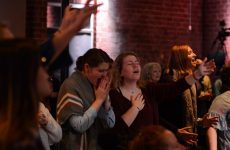It’s not rare for a defense attorney to tell a judge his client is a good man. A religious man, even.
It no doubt happens at sentencing hearings in courtrooms across the country every day.
But here’s a twist.
The attorney for an O’Neill man in his 70s — indicted in a conspiracy to harbor illegal immigrants following a raid last year — wants to raise a sort of Good Samaritan defense at his jury trial in September in a case involving his interactions with a husband and wife who managed his Mexican restaurant on Main Street.
The government says John Good was conspiring to commit a crime. The defense says he was following the tenets of his faith.
But first, his attorney, David Domina, had to try to convince Chief U.S. District Judge John Gerrard that it was a valid legal defense that jurors should be allowed to weigh.
In a brief earlier this year, he said his client lived out the lesson of the Good Samaritan parable in his dealings with the Hispanic couple he helped.
“Mr. Good did not harbor, conspire, conceal, hide or launder money. He lived the Christian convictions of his upbringing in his faith,” Domina said. “Now the government charges that Mr. Good’s religious convictions, when put into active expression in life, are felonies.”
He said Good gained nothing but the satisfaction of helping the couple and the pride in their success.
But the government sees it differently.
They say Good helped Juan Pablo Sanchez-Delgado and Magdalena Castro Benitez hide commercial assets and businesses in his name and helped Sanchez-Delgado hide from immigration authorities.
They say on June 21, 2018, Good told the couple of a possible presence of Immigration and Customs Enforcement officials in the area and suggested they close the restaurant.
Sanchez-Delgado since has admitted to profiting off a plot he led to supply cheap, illegal immigrant labor to farm operations in the area and is set for sentencing later this year.
Domina said Good was in no way involved in trafficking in human workforce or providing employment or withholding funds due the workers. He was just trying to help people who wanted to build the community, start new businesses, establish homes and have children there and had no desire to probe whether they were “Americans” or “illegals.”
He said Good is accused of crimes for his decision to allow his friends to manage his restaurant a block and a half from the courthouse, the sheriff’s office and the police station. Domina said he didn’t employ workers, collect rent or sell his home to the couple at a gain; and he also didn’t concern himself with checking for citizenship papers.
“While O’Neill may not be in plain view of the television cameras of major networks, and may not be visible from the West Wing of the White House, it is in plain view of law enforcement. And its Mexican restaurant, La Herradura, welcomed as patrons the local prosecuting attorney, the sheriff and his deputies, the mayor and his State Patrol colleagues, local judges, and all members of the community,” he said.
He said Good arguably could have violated the law simply by encouraging a needy traveler to pull off the road and sleep before going on, or buying him a tank of gas and a cup of coffee or encouraging him to stay in a church’s emergency guest quarters “all without conducting a cross-examination on the issue of lawful presence in the United States.”
Under the same law, Domina said, abolitionist John Brown would have been guilty for his work on the Underground Railroad, since southern slaves weren’t considered American citizens.
But Assistant U.S. Attorney Lesley Woods filed a motion asking Gerrard to issue an order prohibiting Domina from raising the free exercise of religion as a defense to his charges at trial.
She argued that the practice of Christianity doesn’t provide a “constitutional shield to conspiring to harbor aliens.”
Woods said federal appellate courts in other parts of the country have concluded that the government has a compelling interest in regulating its national borders and the interest in uniform application of those laws allows no room for exceptions.
And, she said, it was irrelevant to present evidence that Good had acted either entirely or partly based on Christian motivation, because three U.S. Circuit Courts, including the 8th to which Nebraska is a part, specifically have found that not to be a valid constitutional defense.
If Good were allowed to present the defense, Woods argued, it only would confuse and mislead the jury about whether the free exercise of religion can be proper grounds for jurors to find Good not guilty of harboring aliens and money laundering and invite the jury to acquit him out of sympathy for his religious beliefs.
“It is not a central tenet of Christianity to exploit others and to defraud governments,” she wrote in a brief to the judge.
On the other side, Domina argued it was a valid defense under a provision of the Religious Freedom Restoration Act that says a person whose religious exercise has been burdened can assert that violation as a claim or defense in a judicial proceeding.
In an Aug. 12 order, Gerrard said: “That’s true enough — but that’s not really the issue.”
Here, he said, the issue is not whether Good’s faith could provide some sort of defense.
“It’s whether that defense is a matter for the court, or for a jury,” the judge said. “And there’s no question that it’s a matter for the court.”
Gerrard pointed to a 2017 8th Circuit decision in the case of a man caught distributing heroin who was barred from arguing that the free exercise of his religion required him to do it because prosecuting him was the least restrictive means to further a compelling governmental interest.
“The same is true here: even assuming the defendant’s sincerity — and the court does — the court has already rejected his defense as a matter of law,” Gerrard said.
Good’s federal trial is set to start Sept. 16.



